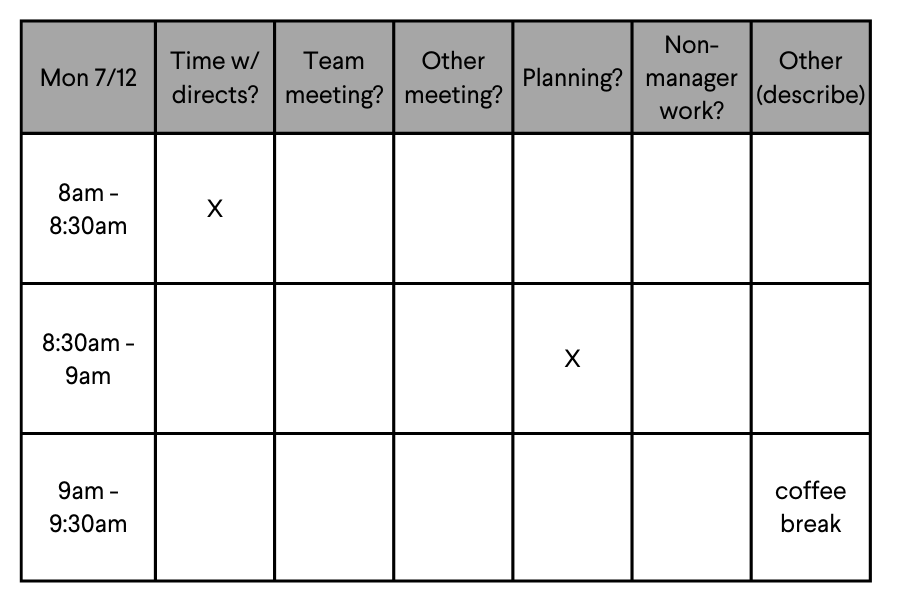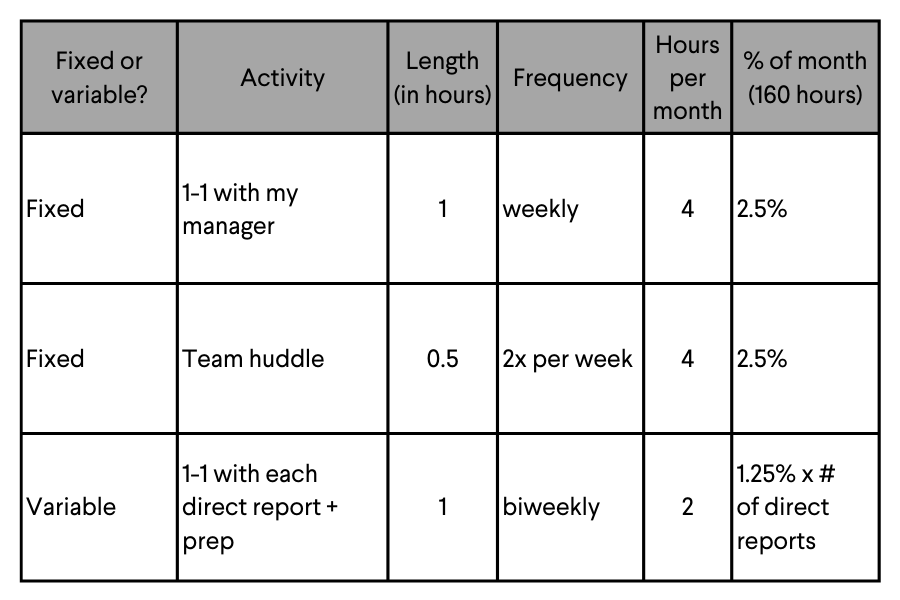Do your managers even have time to Manage?: Capacity planning for manager effectiveness
5-minute read
It has been the case for a while now that managers say they don’t have time to do their jobs well. This sentiment has gotten more widespread and urgent since 2020. While companies have traditionally dismissed the concern (who doesn’t wish they had more time in the day?), it is becoming increasingly dangerous to ignore the problem.
The trouble with manager capacity debt
When managers lack the physical time to accomplish the responsibilities of their role, it forces them to make tradeoffs that result in even greater time scarcity in the future. Think of this vicious cycle as ‘capacity debt.’ For example, managers who lack time to develop their team, pay for it with “interest” when their team members become disengaged or quit because they don’t feel they are growing. Managers who can’t find the time to give feedback, pay for it when their team members can’t achieve their goals.
And, of course, a chronic sense of time scarcity and the feeling of powerlessness it creates lead to a rise in manager burnout. Not only does manager burnout result in costly turnover, manager effectiveness is an essential driver of organizational success.
How to carve out management time
Many companies simply assume that it's their managers’ responsibility to develop better time management skills so they can fit in all of their work. And this can certainly be the case (and why we teach Productivity & Prioritization skills at LifeLabs Learning!). But through our experience studying and teaching over 100,000 managers at more than 2,000 companies around the world, we’ve found that the challenge managers face is usually a combination of personal time management and organizational time allocation.
Once you have a decent idea of your manager role requirements, success metrics, behavioral standards, and core skills, step back to see whether your company has carved out sufficient time for your managers to actually do their jobs well.
Here is how you can determine the capacity your managers need:
Conduct a time audit. Ask at least 20% of your managers to track where their time goes for at least one typical week. Be sure to recruit managers from different departments and with different backgrounds. Offer a template spreadsheet like the one below to make it easy to mark down different types of activities.
Set a time allocation. Based on your findings, come up with an approximate amount of time you will set aside for managers to do the manager part of their job. Include a 20-30% buffer so there is sufficient elasticity in your system to respond to unexpected emergencies that require an amping up of time. Factor in your PTO allotment.
Be sure to take into account that managers of different roles and scopes of responsibility will likely need different time allotments. A manager who supports employees that do quick-to-learn and easy-to-assess work might be successful with 10-20 direct reports while a manager who supports a complex function and also produces their own work might only have capacity for 3-4 people.
On average, we’ve found that managers require 2-4 hours per week per direct report. It’s okay to start with a rough estimate as long as you set expectations that this allocation will likely change as you build more efficiencies into the role or add responsibilities. Record this time allocation in the manager role description and any spots that inform your hiring decisions.
Make adjustments. If you discover that some managers have too much or too little capacity, make changes to create the right balance. For example, assign fewer direct reports or projects to managers who have hybrid ‘player-coach’ roles. Once again, this is a good time to remind people that these changes may be temporary and are a work in progress. Moving forward, as you increase efficiency (e.g., automate onboarding) or add on expectations (e.g., request that all managers attend weekly cross-functional meetings) re-adjust the allocation accordingly and communicate the new formula. Clarify that the time allocations are approximate and serve as a guide for managers and for hiring decisions.
BONUS - Clarify tradeoffs: Even if your allocation seems perfect, your managers will invariably face instances where it’s still impossible to cross off every item on their to-do list. This tension is especially common for managers who have a hybrid player-coach role. To help your managers make good decisions in these moments, make implicit priorities explicit. For example: if time is short, the tradeoff we expect is to help your team build their skills even over meeting project deadlines. Or: If you have to choose between one or the other, keep your one-on-one time sacred even over responding to email within 24 hours.
Sample time audit template to share with your managers:
Sample time allocation results tracker:
Want to help your managers get the most out of their time and develop essential skills faster? Contact LifeLabs Learning!
The Great Managers Playbook
Unlock the power of your managers
Download Part I and II of The Great Manager Playbook today. By signing up to download Part I and Part II, you’ll receive Part III (coming soon!!) in your inbox as soon as it drops.



